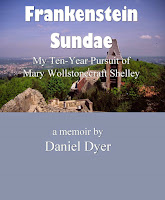I begin reading Mary Shelley's 1826 novel, The Last Man.
But by
January 1826, Mary had finished and published the novel—and it remains one of
her most interesting to read today, especially in this time when threats from
infections and biological warfare and end-of-humanity plagues have become more
and more real. And possible. Perhaps even likely. (Not to mention the stuff of
countless novels and films and TV shows!)
I just
consulted my file on The Last Man (a
file I’ve not removed from its drawer and opened in a very long time). I see
that I read the book back in the spring of 1997—April 7–May 2. Very early in my
Mary Shelley research. I had retired from my public-school teaching career only
three months earlier. We were still living in Aurora, Ohio (about thirty miles
southeast of Cleveland)—a convenience for more than one reason: I had been
teaching in Aurora (we lived only blocks from the middle school); Joyce was
teaching at Hiram College—just eleven miles away with a single stoplight
between our house and Hiram; Joyce’s mother, who had died from
Alzheimer’s-related complications on February 5, 1995, had been living for some
time at a local nursing home (one of the principal reasons for our move to
Aurora). Joyce visited her virtually every day.
I had begun
keeping a journal when I retired in January 1997, and as I look back at the
entries, I see the evolution of my post-retirement daily routines. I was
getting up a bit later than I had been when I was teaching. I was always one of
the first to arrive at school—around six a.m.—but now, I see from that journal—that seven
(and even later) was my new custom. (Ah, retirement!)
On April 8,
for example, the second day of my reading of The Last Man, I wrote the following in my journal (somewhat
abridged):
8th: Up early (7:30), fussed
with computer, then to Heinen’s [a local grocery store with a coffee shop] to
read more of The Last Man; Saywell’s [a
coffee shop in nearby Hudson, Ohio] for coffee with [a former Western Reserve Academy colleague] and to
return Leigh Hunt’s autobiography to the [Hudson] library; … [at home] ran 5
miles; worked on index [to my forthcoming YA book Jack London: A Biography] all
afternoon; index after supper (finished 100 pgs.); typed notes on chaps 2–3 in The Last Man; read Lawrence Block [Even the Wicked, a detective novel] in bed; started Tribe game in Seattle [I just
checked: The Tribe won, 8–3, homers by Manny Ramirez and Sandy Alomar, winning
pitcher: Charles Nagy]; finished Block novel—not very good, too predictable (he
solves three cases in the book, one—the killer of a drama critic—is
transparently the news writer; none of the usual grit and angst); began the new
Spenser [Small Vices, by Robert B.
Parker]; it starts well.
So … there I
was: early April 1997 (I was 52 years old)—sleeping a little later, reading all sorts of things,
writing, running, watching baseball games, drinking lots of coffee, still
living as if my future were endless. And now—nearly twenty years later—I can no
longer run (knees, ankles)—though I still ride an exercise bike and walk laps;
I gave up watching sports several years ago. But I do still read thrillers and still spend much of my day reading and
writing. And drinking coffee. Oh, and I usually get up around six now. Tempus fugit and all that.


and you still visit the Hudson library!!!
ReplyDelete